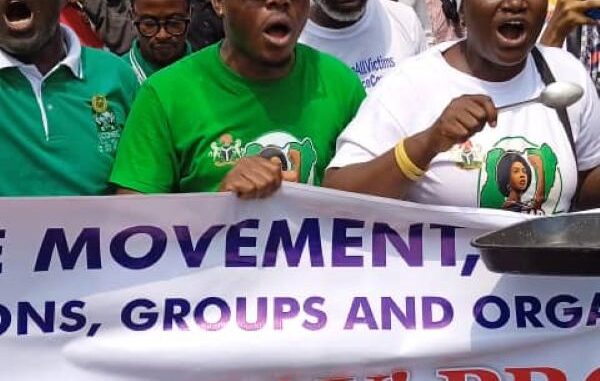
On June 12, protests were held in a few states across the country as a continuation of an expression by the working masses and youth of their rejection of the anti-poor capitalist policies of the Tinubu government and its descent into civilian dictatorship with attacks on democratic rights. In other words, the conduct and action of the Tinubu government, which celebrates June 12 as “Democracy Day”, runs contrary to the ideals of the day which was a watershed in a protracted struggle of Nigerians to end military dictatorship and enthrone a democratic rule with the hope of better living standards. However, it is apposite to state that on the basis of bourgeois democracy and economic programme, especially in a neo-colonial country, there was no guarantee that June 12 election won by MKO Abiola would have heralded better living standards for the vast majority.
Members of the Democratic Socialist Movement (DSM) joined socialists and civil society activists to organise protests in Lagos, Oyo and Osun states. The turnout was small compared to the recently past nationwide protests, for instance the last October 1 protest, not talk of the #EndBadGovernance protests in August 2024. For instance, Lagos which recorded the biggest outing had just about 300 protesters.
However, the protests, which were energetic and inspiring, enjoyed massive support from passers-by, bystanders, motorists and residents of areas the protesters passed. This underscores the fact the vast majority of working people and youth remain vehemently opposed to the Tinubu government and its policies. Indeed, this is reflected, in Lagos for instance, in an impressive sale of Socialist Democracy, the paper of the DSM. with a frontpage headline: “Tinubu Has Failed Nigeria”, with the majority of the copies sold being bought by those on the sidelines of the protest. It actually shows that the assertion of the headline resonates with most Nigerians on whose living standards and livelihood the capitalist policies have had devastating effects. For instance, a journalist who bought the paper in Ibadan used the image of the front page with the headline to illustrate the feeling of many Nigerians on the failure of the government in an open letter he did to Tinubu on social media.
The relatively small turnout at June 12 protest is most likely because the past actions were not able to force the Tinubu government to reverse the ruinous policies coupled with its sustained attacks of democratic rights attacking as a deterrent to any resistance and opposition to the policies. Therefore, many chose not to expend their time and energy on the protest but rather faced their daily struggle for survival. The leadership of the labour movement deserves the most blame for this situation. If they had not refused to put forward organised labour as a platform for a serious mass resistance against the anti-poor policies, some real concessions could have been won if not an outright reversal. We therefore reiterate the call on workers and trade union activists to mount a sustained pressure on the labour leadership to organise a serious struggle, for instance, a 24-general strike and mass protest as the first step, against the anti-poor policies of the Tinubu government. Despite a legitimate lack of trust in the leadership of labour by the working people and youth because of the past betrayal a serious mass mobilisation can draw massive supports for a general strike and bring several thousands on the street.
Therefore, the resolve of the working people, youth and activists who have sustained the resistance in the face of a depressing mood, the indolence of labour leadership and the intimidation of the Tinubu government is commendable. They have helped put on the front burner the feeling and position of the vast majority who are firmly against the anti-poor policies despite the propaganda of the government.
The protest despite its size also served as a bold statement and warning to the Tinubu government it is not a walkover for it. The government had to organise a counter protest in Lagos and deploy the police to attempt to intimidate and disorient the anti-government protesters. Besides, given a deep-seated mass anger against the government, it is not ruled out that a spark could provoke a tumultuous revolt before the next general elections.
The support of the Nigeria Bar Association (NBA) Ikeja branch for the protest in Lagos is commendable. Before the protest they sent a letter to the state Commissioner of Police warning him against any plan to violate the rights of the protesters and did a fantastic report, which was widely circulated, after the protest highlighting the unprofessional conducts of the police including their expected bias towards the pro-Tinubu protesters.
Altogether, tens of thousands copies of separate leaflets issued by the #EndBadGovernace Lagos State, Joint Action Front (JAF) and DSM were widely circulated before and during the protest. The leaflets and also various placards in these protests generally call for the reversal of the anti-poor policies, end to attacks on democratic rights, dropping of trumped-up charges against Michael Lenin and others still on sham trial in connection with the #EndBadGovernace nationwide protest of August 2024, a serious tackling of the deepening insecurity etc. The materials of both the DSM and JAF in addition argue for why the working people and youth in addition to sustaining resistance against the anti-poor policies must also support building of a mass working people party on a socialist programme.
